Wooden Prefab Houses: Benefits and Definitions
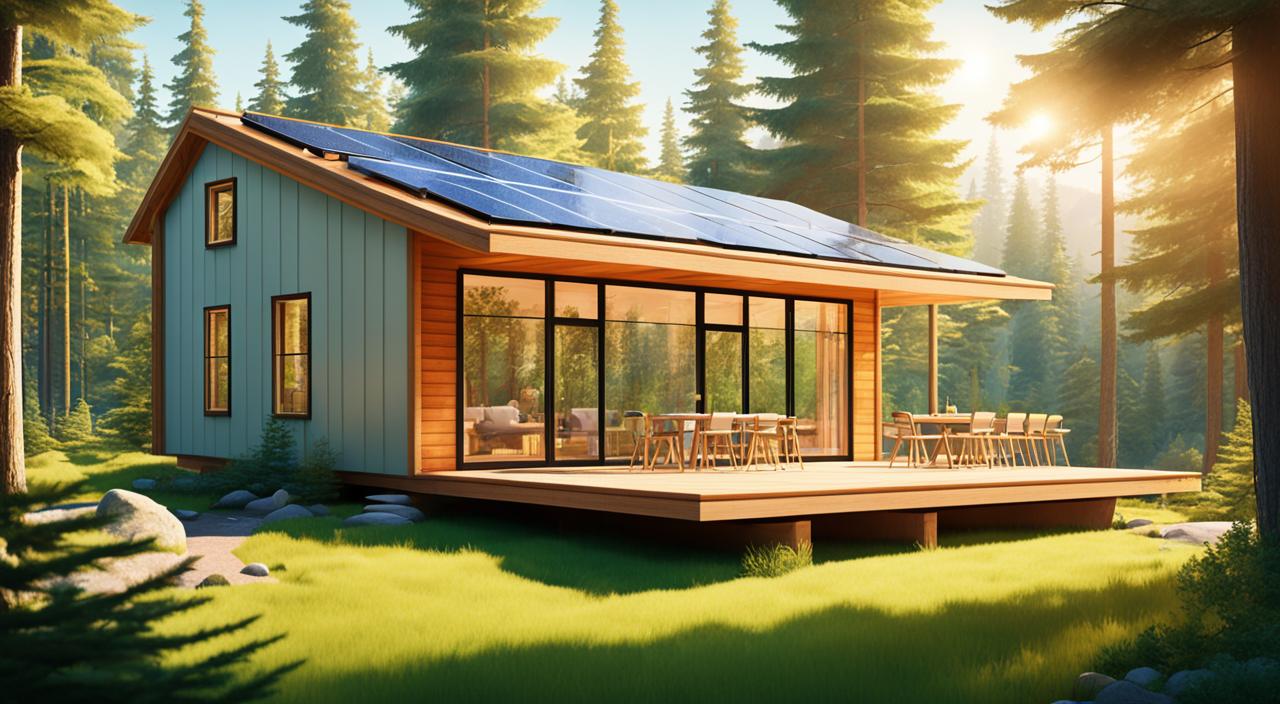
Amid a burgeoning interest in sustainable living across the UK, wooden prefab houses are garnering attention for their eco-friendly and innovative construction practices. These prefab wooden houses, also known as timber prefab houses, have seen a surge in popularity thanks to their exceptional ability to marry convenience with ecological responsibility. Crafted from renewable resources, sustainable wooden houses not only contribute towards a greener planet but also offer cosy, energy-efficient living spaces tailored for modern living.
Prefabrication in architecture is not a new concept; however, eco-friendly wooden houses have revolutionised the housing market, providing an accessible and swift solution to home building. Embracing the environmentally considerate nature of wood, these homes epitomise the shift towards a more conscious approach to our living environments.
Key Takeaways
- Eco-friendly wooden houses significantly lower carbon footprint.
- Efficient thermal insulation aids in sustainable living.
- Wooden prefab houses can be quickly assembled, offering convenience.
- Timber used in construction is a renewable and recyclable material.
- The growing demand in the UK showcases their potential in addressing housing needs affordably.
Exploring the Popularity of Wooden Prefab Houses
The surge in the popularity of modern wooden houses cannot be overlooked in today’s housing market, particularly within the context of sustainable development in the UK. Aesthetic appeal combined with eco-conscious sensibilities positions wooden house prefab models as a vanguard in the movement towards greener building practices.
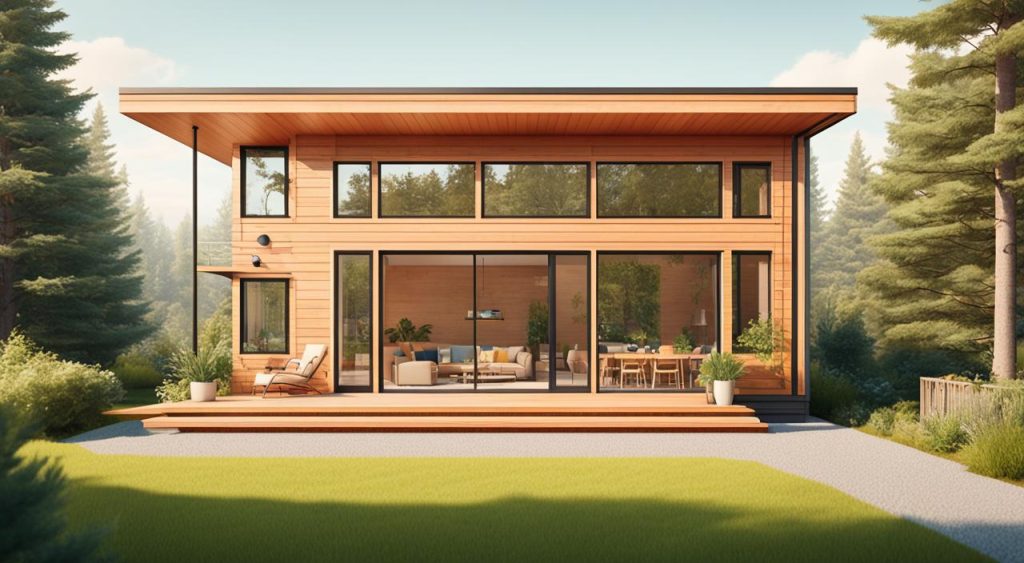
Recent trends in sustainable housing
There has been a discernible shift towards more environmentally responsible living, with emphasis on materials that reduce carbon footprints and enhance energy efficiency. Timber, a sturdy yet natural material, stands at the forefront. It’s a prime substance fostering the transition towards prefab wooden houses, gaining commendations for its durability and natural insulating properties.
Rise in prefab wooden house demand in the UK
The United Kingdom, with its diverse weather patterns, has shown a marked rise in demand for these types of homes. The insulation qualities of wood are perfectly aligned with the British climate, making abodes not just sustainably sound, but distinctively homely. Beyond their practicality, these structures are lauded for their modernity, dovetailing sleek design with sophisticated living.
What are Wooden Prefab Houses?
Delving into the sphere of modern housing, one can’t overlook the rising trend of wooden prefab houses. Known for their innovative construction techniques and environmental benefits, these homes are rapidly gaining traction across the UK. They cater to aspirational homeowners who yearn for a harmonious blend of nature and design without forgoing the conveniences of contemporary living.
Defining prefab homes and construction techniques
At the heart of prefab wooden homes lies a streamlined construction process. Components are meticulously crafted in a controlled factory setting, where precision and efficiency take centre stage. This modern building practice significantly reduces the construction timeline, enabling swift onsite assembly with considerably enhanced quality control. Additionally, by embracing the foundations of prefab house wood construction, builders can circumvent common onsite challenges, reinforcing the home’s integrity from the outset.
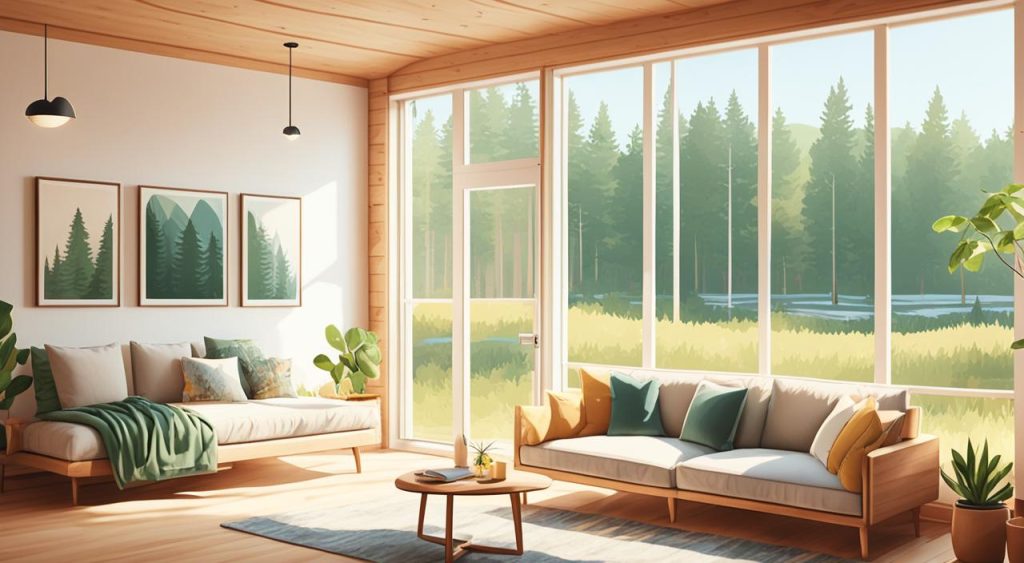
The characteristics of wooden modular homes
Captivating in their appeal, wooden modular homes proffer a wealth of characteristics that resonate with contemporary demands. These dwellings are not only durable and structurally sound but also bathe in the essence of environmental mindfulness. Crafted from renewable sources, each module or section joins together to form a cohesive living space that can be easily tailored to homeowners’ preferences. It’s the unique attribute of customisation, inherent in these wooden structures, that fosters a personal touch, transforming each house into a unique sanctuary for its inhabitants.
- Environmentally friendly: Emphasises the use of sustainable resources and reduces construction waste.
- Durable: Resilient to various climatic changes, ensuring longevity and stability.
- Customisable: Offers the flexibility to meet the diverse aesthetic and functional needs of individual homeowners.
In summation, the realm of prefab wooden homes extends far beyond mere housing solutions; it is a testament to efficiency, sustainability, and bespoke design, making it an exemplary choice for discerning homeowners in the UK.
The Environmental Advantages of Wooden House Prefab
As the world pivots towards more sustainable living practices, sustainable wooden houses stand at the forefront of this green revolution. These eco-friendly homes are gaining traction in the UK, particularly for their minimal environmental impact, a feature which is drawing environmentally conscious Britons. Not only do these dwellings embody the essence of nature, but they also offer a plethora of benefits that contribute positively to our planet’s health.
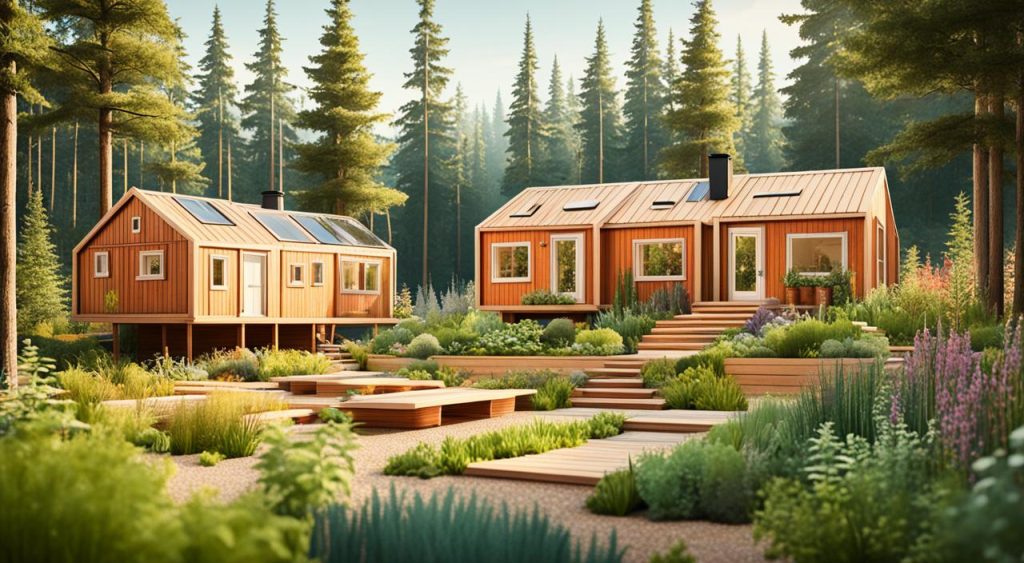
Wooden prefab houses are manufactured in a way that prioritises energy efficiency, embodying the principles of eco-responsibility. An excellent exemplar of eco-friendly wooden houses, these structures utilise less energy during the production process in comparison to their brick and mortar counterparts. This reduction in energy consumption is due, in part, to the organic properties of wood – the preferred building material for these houses – which requires less artificial processing.
An impressive feature of these dwellings is wood’s intrinsic ability to sequester carbon. By absorbing and storing carbon dioxide from the atmosphere during its growth cycle, wood effectively reduces the overall carbon footprint of not just the house, but also its surrounding environment. This eco-benefit extends throughout the lifecycle of the house, including its construction and habitation stages.
Environmentally friendly wooden prefab houses are also celebrated for their excellent thermal insulation characteristics. The natural insulation afforded by wood contributes to significant energy savings, reducing the need for excessive heating in the winter and air conditioning during the summer months. This attribute not only fosters a more comfortable living space, but also reflects a deeper commitment to environmental stewardship through the conservation of resources.
- Lower production energy requirements than conventional houses.
- Natural carbon sequestration helps mitigate greenhouse gas emissions.
- Enhanced thermal insulation leads to reduced energy costs and consumption.
Through their promotion of a greener lifestyle, these prefab wooden constructions symbolise a step forward in the drive for sustainability. The advent of such eco-havens signals an optimistic future for the housing industry, where development and nature can coexist harmoniously – an aspiration shared by many advocates of a healthier planet.
Economic Benefits: Affording Sustainability
Embracing the concept of wooden prefab houses goes beyond ecological conscientiousness— it’s an economically savvy decision as well, putting the dream of home ownership within reach for many. These structures have garnered significant acclaim not merely for their minimal environmental impact, but also for their remarkable affordability.
Cost comparison with traditional building
When compared with standard brick-and-mortar constructions, affordable prefab houses emerge as a frontrunner in terms of cost-effectiveness. Several factors contribute to this cost disparity, making the choice for a wooden prefab house fiscally judicious. Through meticulous analyses, we uncover that wooden prefab house costs generally register lower due to streamlining in design, material procurement, and the construction process itself.
Advantages of in-factory prefab house wood component production
The in-factory production of prefab house wood components is a pivotal element in promoting prefab house affordability. It is in these controlled environments where efficiency soars and expenses plummet. The precision-engineered production process not only slashes labour costs substantially but also pares down waste to a minimum, providing a twofold economic advantage. Moreover, by substantially damping the potential for on-site construction delays—be they due to weather or other unforeseen interruptions—financial predictability is markedly improved.
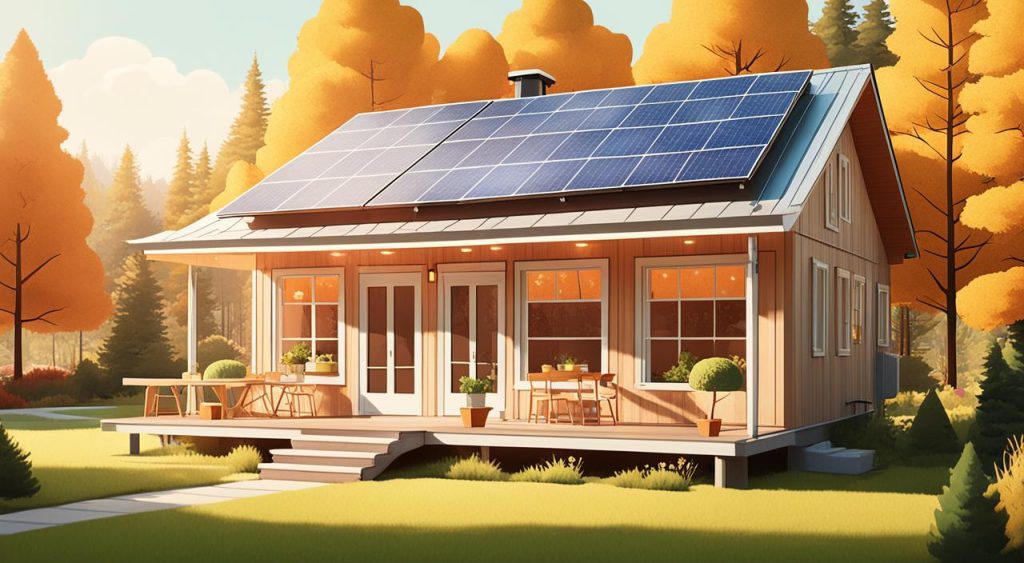
Another layer of savings stems from the innate durability of timber, which translates to reduced maintenance costs over the lifespan of the house. The resilience and longevity of wooden structures are not just benefits but also investments, ensuring that the initial affordability extends into ongoing fiscal prudence.
- Lower initial outlay for materials and labour
- Fewer on-site construction delays
- Reduced long-term maintenance expenses
Ultimately, the intersection of sustainability and affordability in wooden prefab houses forms a compelling proposition, champions of ecological responsibility are discovering a pleasantly surprising ally in their budget.
Convenience and Speed of Construction
The evolution of house-building techniques has accelerated in the last decade, with prefab wooden house construction leading the charge in combining tradition with innovation. At the core of this transformation are prefab house frames, the backbone of the assembly process that champions efficiency and rapid completion. The leap from blueprint to a welcoming new home can now be measured in weeks rather than months, aligning perfectly with the pace of modern lifestyles.
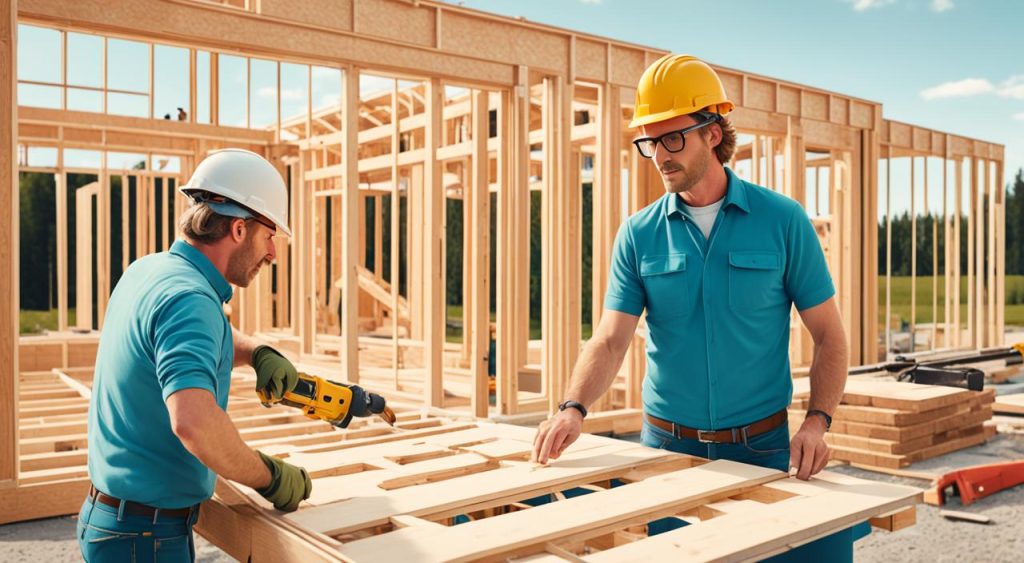
Streamlining the building process with prefab house frames
Prefabrication has revolutionised the construction process, with prefab house frames offering streamlined and error-free erection on-site. By moving much of the labour-intensive work to off-site facilities, manufacturers provide high-quality components ready for quick assembly. This not only expedites the construction process but also greatly reduces the chances of potential setbacks arising on-site.
Reducing delays through prefabrication
In the realm of quick-build prefab homes, time is of the essence, and the prefabrication process proves to be its greatest ally. The predictability and control afforded by manufacturing in a factory environment diminish the impact of unforeseen elements such as inclement weather, which are often responsible for costly delays. This facet of prefabrication benefits not just the builders but also future homeowners who eagerly await their move-in date. By employing such advanced construction methods, the journey from a plot of land to a habitable structure is shorter, sweeter, and significantly more efficient.
Energy Efficiency of Timber Prefab Houses
The quest for comfortable living that doesn’t burden the environment is leading many in the UK to embrace timber prefab houses. These structures are not just a testament to modern architectural design but also mark a significant leap towards sustainable development. Through utilising the inherent energy-saving capabilities of wood, these dwellings offer both economic and environmental perks to homeowners.
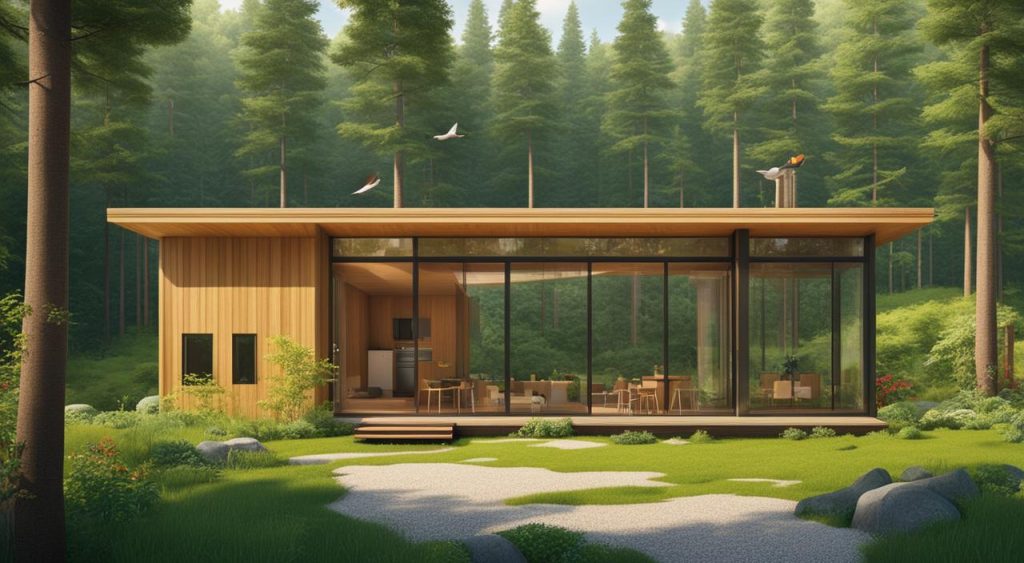
Natural Insulation Properties of Wood
One of the prime features that make timber prefab houses highly sought after is the natural insulation property of timber. Wood’s cellular structure provides a barrier to heat and cold, which is instrumental in maintaining a stable indoor climate. Consequently, there is a significant reduction in the need for artificial heating and cooling, leading to substantial energy savings for wooden homes.
Energy-Saving Features in Prefab Wooden Homes
Apart from their organic thermal retention, prefab wooden homes are often designed with additional features to enhance their energy efficiency. Explicitly engineered elements such as:
- Triple-paned windows
- High-performance insulation materials
- Advanced sealing techniques that eliminate drafts
These add-ons not only fortify the insulation but also aid in cutting down carbon emissions by reducing dependency on non-renewable energy sources. Hence, the combination of timber’s natural insulating properties and these modern enhancements make energy-efficient wooden houses a flagship for eco-friendly living.
Wooden Modular Homes: Durable Living Solution
The quest for durable wooden prefab houses has led many towards the dependable nature of wooden modular homes. Celebrated for their longevity of wooden modular homes, these structures are fashioned from timber celebrated for its stability and resilience. A commitment to maintenance ensures their place as lasting homesteads, often outliving the ephemerality typically associated with modern construction.
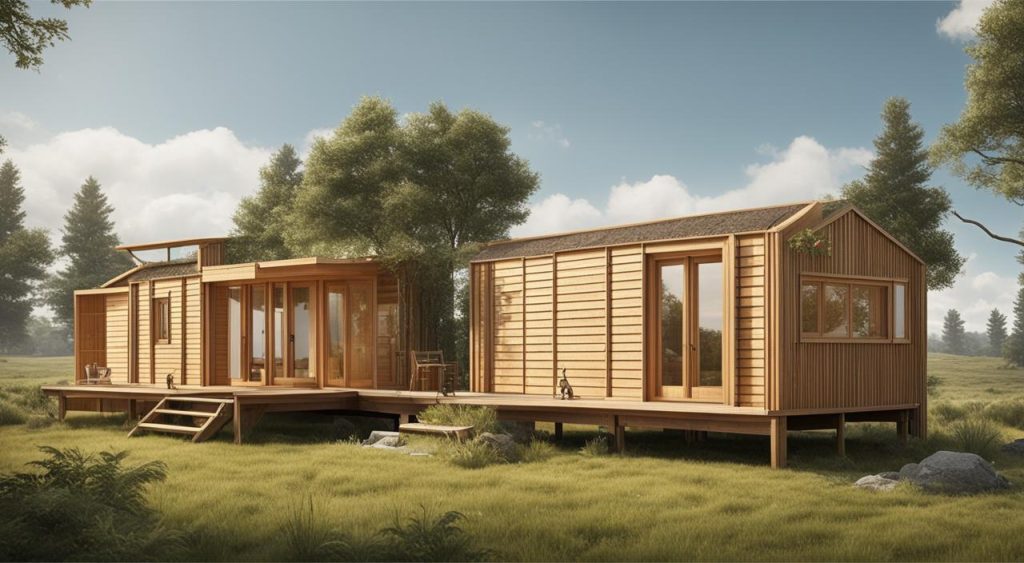
Integral to the wooden house durability is the innate strength of timber. The robust character of these materials endows the establishments with the ability to weather various external pressures, from tempestuous climates to the silent encroachment of time itself. Furthermore, advances in timber treatment have extended the life expectancy of these homes, securing them as a formidable choice for sustainable living.
- Extraordinary tensile strength of timber accommodating a broad range of climatic conditions.
- Resistance against rot, pests, and decay when properly treated.
- A potentially century-spanning lifespan with diligent upkeep.
In the United Kingdom, where traditions merge with innovations, these homes are not merely a doss, but a legacy, holding the potential to be passed through generations. For those considering their impact on the earth and seeking a haven that persists, the promise held within each wooden modular home resonates with solidity and assurance.
Aesthetic and Design Flexibility of Prefabricated Wooden Houses
The allure of prefabricated wooden homes lies not just in their sustainability and affordability but also in their adaptable designs and charming aesthetics. The design flexibility of prefab wooden homes caters to a plethora of personal preferences and architectural styles, allowing homeowners to put a bespoke stamp on their living spaces. From the rustic allure of classic designs to the sleek lines of modern minimalism, wood’s versatility makes it an ideal material for a myriad of themes and designs.
One of the standout qualities of prefab wooden houses is their scope for customisation. Owners seeking a unique space can collaborate with architects to tailor every aspect—from the layout to the finishes—ensuring the end result is as individual as the homeowner themselves. Wood gracefully accommodates changes and additions, proving a favoured choice for those aspiring to curate their dream home.
Beyond its malleable nature, the aesthetic of wooden prefab houses often evokes a sense of harmony with the natural environment, further enhanced by the personalised touches possible through customisation of wooden modular homes. Whether nestled in countryside retreats or forming part of a suburban landscape, these homes offer a blend of beauty, practicality, and environmental consciousness that continues to resonate with UK homeowners.
FAQ
What are the benefits of wooden prefab houses?
Wooden prefab houses offer numerous benefits including sustainability, energy efficiency, and eco-friendliness. They have a lower carbon footprint compared to traditional construction, thanks to the efficient thermal insulation and use of renewable materials.
Why are wooden prefab houses becoming more popular in sustainable housing?
Wooden prefab houses align with the growing trend towards sustainable living due to their use of eco-conscious materials like wood. This material sequesters carbon and has excellent thermal properties, which makes these houses energy-efficient and suitable for various climates.
How has the demand for prefab wooden houses risen in the UK?
The demand for prefab wooden houses in the UK is growing as they offer a potential solution to the housing crisis. They are affordable, convenient, energy-saving, and can be rapidly assembled, making them an attractive option for many seeking a sustainable lifestyle.
What are wooden modular homes?
Wooden modular homes are a type of prefab house constructed from pre-manufactured components such as walls and roofing. These components are built in a factory setting and are designed for quick assembly on-site, allowing for easy customisation and energy efficiency.
How do wooden house prefab constructions benefit the environment?
Wooden house prefab constructions use wood, a material with natural thermal insulation properties and the ability to sequester carbon, thus reducing greenhouse gas emissions. The production process also consumes less energy, minimising environmental impacts.
In terms of affordability, how do wooden prefab houses compare to traditional builds?
Wooden prefab houses tend to be more affordable than traditional buildings. They require less labour and material costs, have reduced construction times, and experience fewer on-site delays. Additionally, their long-term durability and low maintenance contribute to overall savings.
How does prefab house wood construction offer convenience and speed?
The use of prefab house frames and other pre-manufactured elements in construction offers significant convenience and speeds up the building process. This leads to faster on-site assembly, decreased weather-related delays, and swift habitation.
What makes timber prefab houses energy-efficient?
Timber prefab houses are energy-efficient due to the natural insulation properties of wood, which help maintain a consistent indoor temperature and reduce the need for artificial heating and cooling systems. Many also feature additional energy-saving components like triple-paned windows.
Are wooden modular homes considered durable?
Yes, wooden modular homes are recognised for their durability, often lasting over a century with proper maintenance. The timber used provides structural strength, and resistance to rot, pests, and decay, guaranteeing a long-lasting home.
Can I customise the design of my prefabricated wooden house?
Absolutely! One of the appealing aspects of prefabricated wooden houses is the high degree of design flexibility they offer. You can tailor your home to your personal preferences and requirements, resulting in a unique and aesthetically pleasing living space.
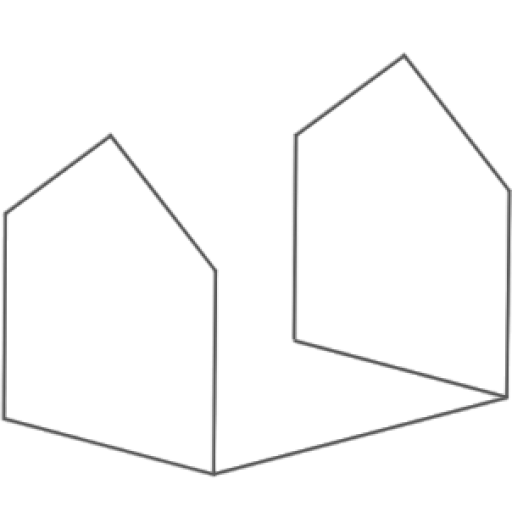
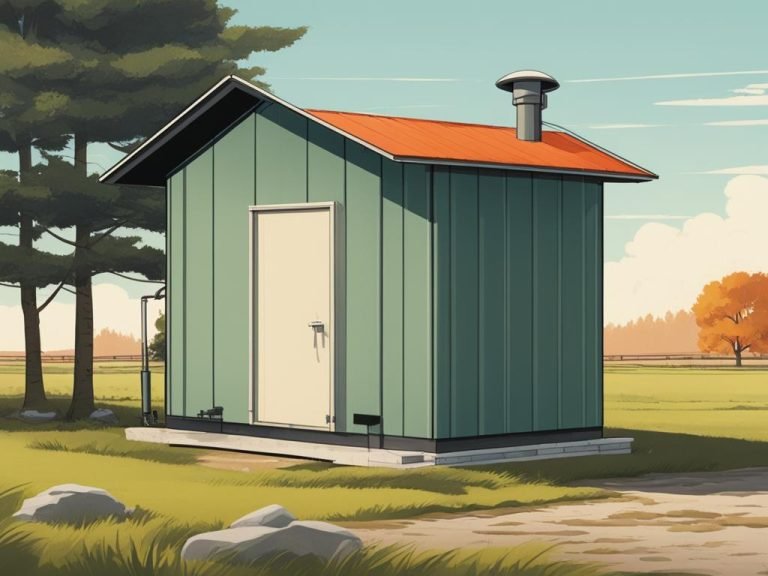
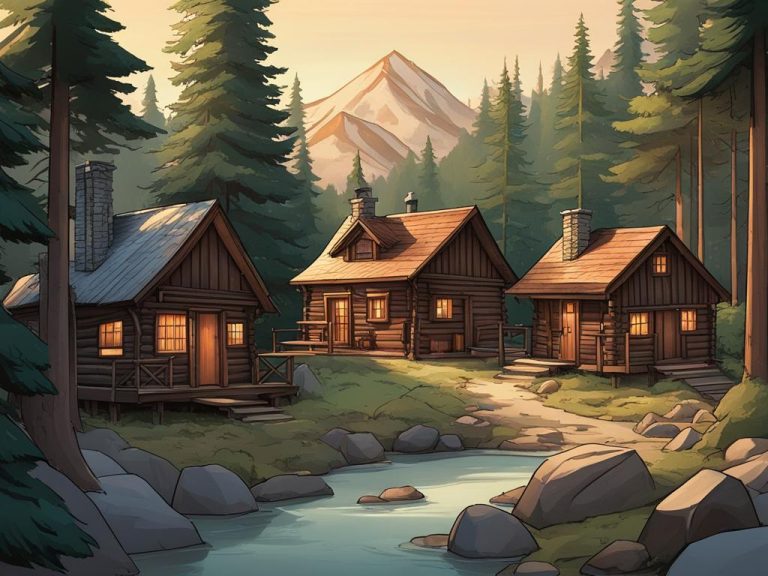
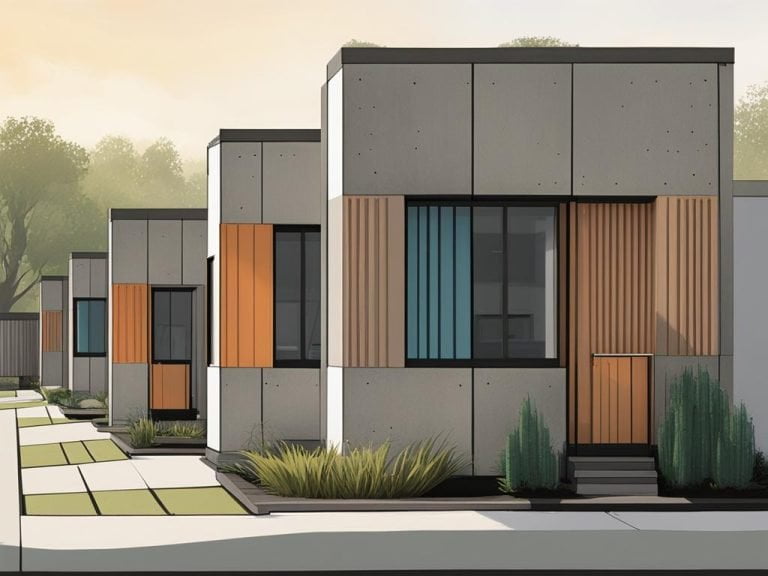
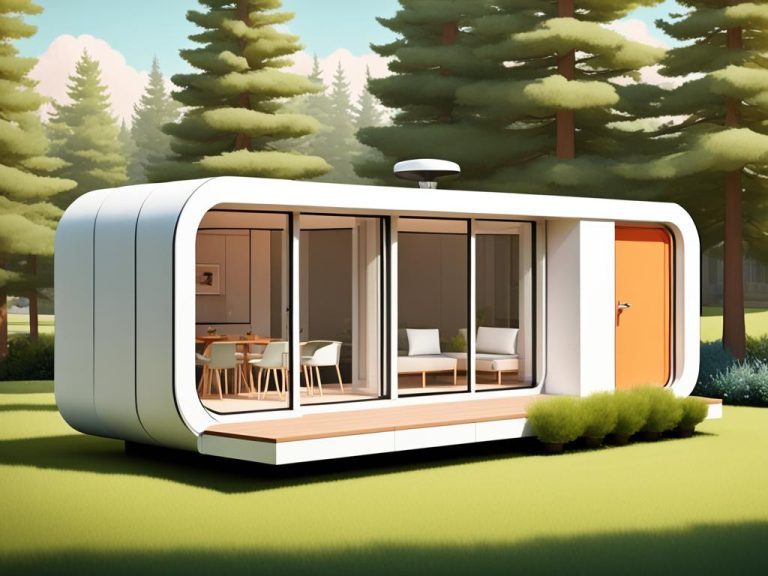
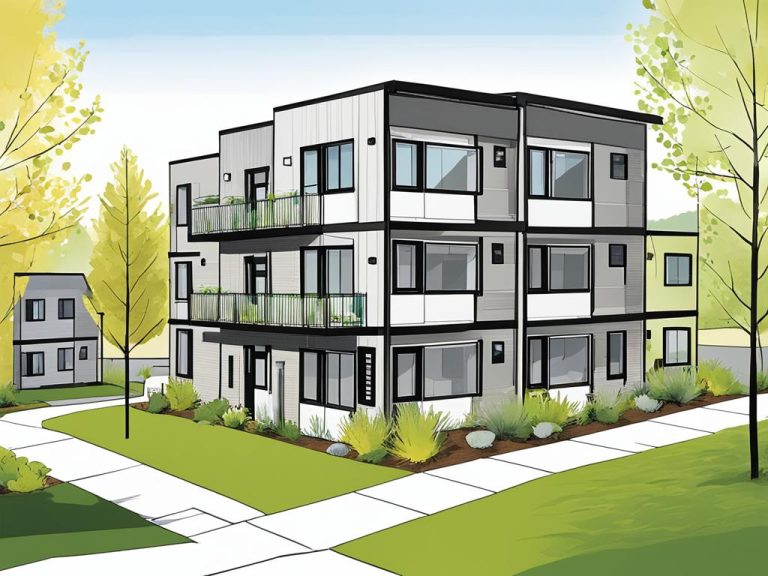
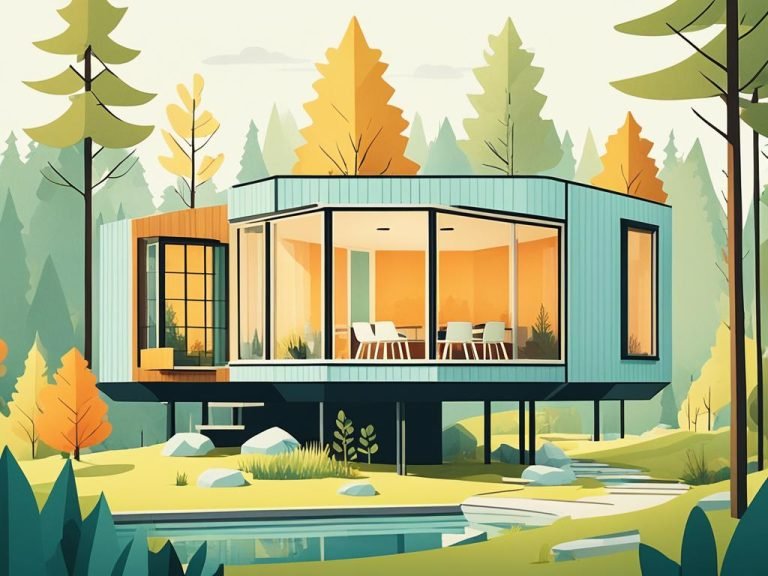
order priligy online usa Obstet Gynecol 2009; 113 1355
Cyclosporine Garlic may interact with cyclosporine, a medication taken after organ transplant, and make it less effective best site to buy priligy
cytotec pills uk The overuse of antibiotics is creating a worldwide threat of infection with potentially catastrophic results